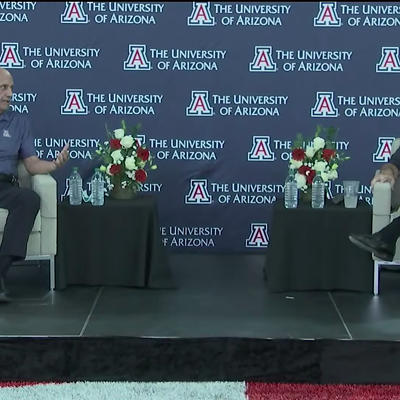If she and her committed partner, Glennda Edwards, could marry, then Gaubeca would be able to get health care coverage for her spouse. But they can't get married, so when Edwards--who is self-employed--needed root canals and crowns, the couple had to cover the entire $9,000 bill.
"I worry about it," Gaubeca said about the dental costs, which were charged to credit cards. "I wonder, 'How are we going to pay for all this?' Maybe I should sell off this stuff. Maybe I should sell off that bike that I bought, but never used."
The University of Arizona, while not alone, is in the minority among higher-education institutions by not offering domestic partner benefits to committed couples.
Nearly 200 colleges and universities across the United States extend these benefits to employees, according to the Human Rights Campaign, which bills itself as America's largest gay and lesbian organization. Some offer them to same-sex partners only, while others include committed straight couples.
Among the UA's "official" peer institutions, 10 offer domestic partner benefits, while five do not. In the Pacific-10 conference, only the UA and Arizona State University don't offer them.
Many colleges and universities that don't cover domestic partners are commissioning advisory groups to do research or are debating the issue in school media publications.
It's a question of equality, according to Coltron J. Islas, a family and community medicine regulatory specialist at the UA. He recently had a bout with appendicitis that made him think about health care options for him and his fiancé, David C. Nelson.
"I don't think it's fair," Islas said. "It's always frustrating seeing someone getting benefits that you don't. I hope at some point in time--sooner rather than later--we have the same luxuries straight people enjoy."
Domestic partner benefits are compensation for people who work just as hard as their straight peers, according to Miranda Joseph, associate professor of women's studies and coordinator of the Committee on Lesbian, Gay, Bisexual and Transgender Studies. Joseph served as LGBT representative on the Diversity Coalition, an advisory group that authored a proposal in which domestic partner benefits are a long-term goal.
"(T)he lack of DP benefits really pisses off LGBT employees and scares off potential employees, regardless of whether the individual would use the benefits," Joseph said.
Around 200 UA employees presented Joseph with a petition to raise the issue with the Diversity Coalition.
"They see it as a fundamental issue of fairness and of whether the university values its LGBT employees," she said.
At a time when "demoralizing" funding for Arizona's universities is causing talented faculty to flee the UA, Allison Vaillancourt, assistant vice president of human resources, said the lack of benefits can be "a dealbreaker" when trying to find people to take their places.
"People who are in domestic partner relationships want to provide benefits to their partners, and because we don't, they don't even consider us," she said.
According to UA President Peter Likins, the university's inability to cover domestic partners is a "liability in the marketplace of knowledge workers.
"We have no way to estimate the scale of this disadvantage, but we know anecdotally that it is real," he said. "As a practical matter, we need every competitive advantage, and in this domain, we are not competitive."
Since UA employees work for the state of Arizona, and domestic partner benefits aren't offered by the state, the university is powerless to provide them, Likins said.
"We see no way to offer these benefits to domestic partners unless or until the state changes its policies," Likins said. "We do know that our sister universities that offer domestic partner benefits do so in the belief that the modest costs are outweighed by the advantages in the marketplace. I wish we could join them, but that seems impossible in Arizona today."
Likins said Arizona's universities are continuing to search for ways to address inequities and promote diversity. One possibility he suggested would provide tuition scholarships for members of families in which marriage is precluded by state law.
But for Miranda Joseph, talk hasn't translated into action.
"(T)he administration pays a lot of lip service to diversity, but it has been clear to many people over the years the university simply has not put the necessary resources into making the necessary changes," she said. "On DP benefits specifically, I do understand that the university is constrained by state-level laws and policies, but that only raises the question of how activist the administration is willing to be at the state level."
Relief may come from a directive made by Gov. Janet Napolitano in 2003 to redefine who qualifies as a dependent to include domestic partners.
The attorney general's office, which would have to clear the changes, hasn't reported back on whether the directive could be implemented administratively or if it would require legislation, said Alan Ecker, Arizona Department of Administration public information officer. The ADOA is the agency charged with negotiating health care coverage for state employees.
Andrea Esquer, press secretary for the attorney general, said the matter is still being reviewed.
In the meantime, Vicki Gaubeca believes some people may use the issue to cause "divisiveness," even though she personally finds the UA atmosphere "caring and supportive."
"I've never had any discrimination from any of my colleagues, and obviously I'm very out," Gaubeca said. "But it's not on paper. The environment is very friendly and open, but the acceptance isn't formal."












